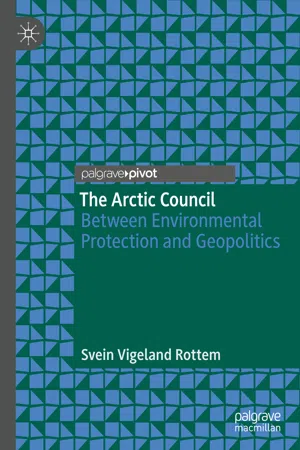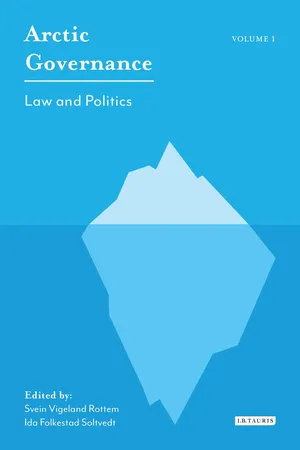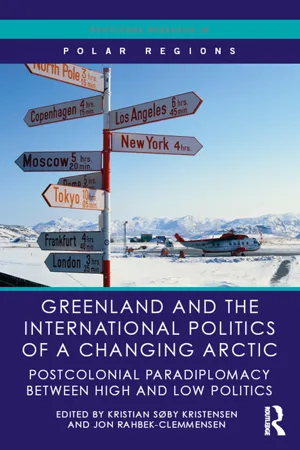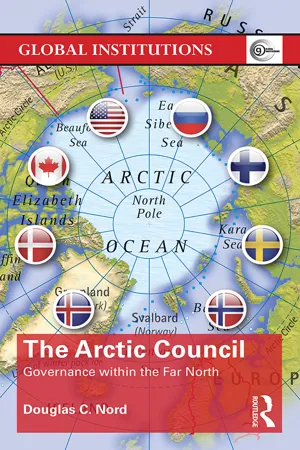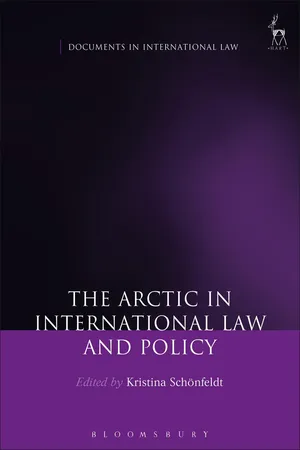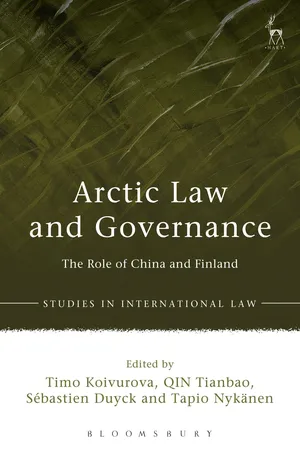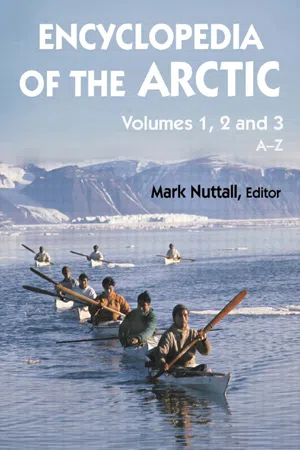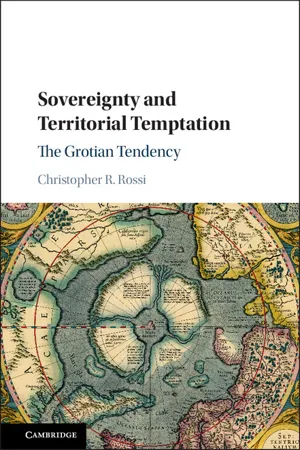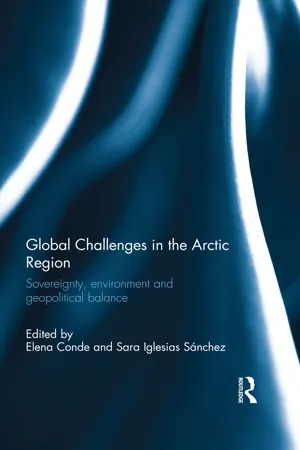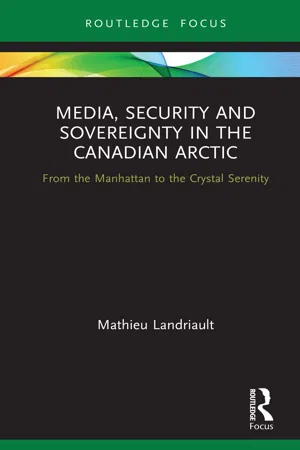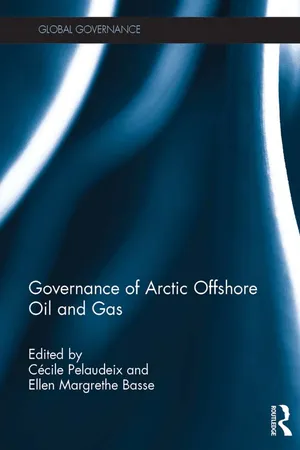Geography
Arctic Council
The Arctic Council is an intergovernmental forum established to promote cooperation among the eight Arctic states and indigenous communities on issues related to the Arctic region. It focuses on environmental protection, sustainable development, and scientific research. The council provides a platform for discussing and addressing challenges such as climate change, resource management, and shipping in the Arctic.
Written by Perlego with AI-assistance
Related key terms
1 of 5
11 Key excerpts on "Arctic Council"
- eBook - ePub
The Arctic Council
Between Environmental Protection and Geopolitics
- Svein Vigeland Rottem(Author)
- 2019(Publication Date)
- Palgrave Pivot(Publisher)
© The Author(s) 2020 Svein Vigeland Rottem The Arctic Council https://doi.org/10.1007/978-981-13-9290-0_1Begin Abstract1. The Arctic Council: From Environmental Protection to Geopolitics
Svein Vigeland Rottem1(1) Fridtjof Nansen Institute, Lysaker, NorwayAbstract
This chapter introduces the topic and the structure of the book and outlines to the history of the Arctic Council, starting from a limited effort to promote cooperation on environmental policy to becoming the most important international forum for discussions on a wide range of Arctic issues. It also portrays the political and geographical landscape the Arctic Council operates in.End AbstractKeywords
Arctic Council Climate change Conflict CooperationIn consequence of a changing climate, the Arctic has once again secured a place on the international agenda. It is in the Arctic global climate change is most conspicuous. Higher temperatures and diminishing ice cover are affecting the basic conditions for actors with interests in the region. Technological progress has also made it possible to extract resources in areas that were previously inaccessible.Commercial activity is increasing and each of the Arctic states wants to take part in shaping the “new” Arctic. In parallel, a number of non-Arctic states also have aspirations for the region. The agenda varies from research to geopolitics, but that something is happening in the Arctic that needs careful monitoring is becoming clear to increasing numbers.Although interest in the region is growing, it is still characterised by political stability and well-functioning governance regimes. Among the Arctic states, there is consensus on the basic rules. That is not to deny the existence of different approaches to what a future - eBook - ePub
Arctic Governance: Volume 1
Law and Politics
- Ida Folkestad Soltvedt, Svein Vigeland Rottem, Ida Folkestad Soltvedt, Svein Vigeland Rottem(Authors)
- 2017(Publication Date)
- I.B. Tauris(Publisher)
by the eight permanent members of the Council, and the Council constituted the negotiation framework. One question is how the agreement has influenced policy in its field. Some might say it is too early to assess its practical impact. In this chapter, we are therefore equally interested in examining its substance and potential importance and ask what the signing of the Oil Spill Agreement indicates about the balance between international and national governance in the Arctic. Norway is used as an illustrative case and was a driving force behind the agreement signed at the 2013 ministerial meeting at Kiruna. This is not to say the analysis below has no relevance to the other Arctic states. An analysis of the effect of the agreement on national priorities might also tell us something about the wider importance of working together on issues affecting the Arctic and the balance between international and national governance in the Arctic. Thus, the ambition of this chapter is two folded; to explain the reality of the Oil Spill Agreement and what this might tell us about future agreements. And secondly address the balance between international and national governance in the Arctic. A key argument is that the Arctic Council falls somewhere in between. Before we examine the substance of the agreement, it is necessary to present a brief account of the Arctic Council. This to establish the context in which the agreement arose as well as portraying the Council's evolution from collaborative body tasked with protecting the environment in the North to an arena capable of negotiating binding international agreements.A Short Story on the Arctic CouncilIn the 1980s the Arctic was marked by the strategic military rivalry between the US and Soviet Union. At the same time, there was growing awareness of the environmental problems affecting the region.5 In his famous Murmansk speech, Mikhail Gorbachev expressed his ambition to change the Arctic into ‘a zone of peace’.6 The stated objective of Canada and the US at the time was also to transform the Arctic into a region of cooperation.7 In September 1989, Finland's government called on the Arctic states to work together to protect the Arctic environment – the so-called Rovaniemi process.8 It was decided that the various countries' authorities with a responsibility for the Arctic environment should meet regularly.9 The undertaking came to be known as the Arctic Environmental Protection Strategy (AEPS). In 1995, Canada expressed a wish to see the AEPS expanded into an international organization. This proposal met with resistance, however – the US in particular was sceptical. The Arctic governments agreed then to organize the enterprise as a forum. The Council is a forum without a “legal personality” and therefore not an international organization as such.10 In 1996, the Arctic Council was officially established through the Ottawa Declaration.11The statutes governing the Council were decided at the ministerial meeting at Iqaluit, Canada, in 1998.12 A key requirement here is that all decisions in the forum and subordinate working groups are to be made by consensus.13 The actual work of the Council proceeds on three levels: ministerial; senior civil servant (SAOs – Senior Arctic Officials); and working groups. When the Arctic states hold ministerial meetings – which constitute the highest decision making authority and usually occur every second year – they tend to attract the attention of the public. In the early years, member states were frequently represented by civil servants at these meetings. This is no longer the case; the 2011 ministerial meeting at Nuuk in Greenland was attended by both Russian Foreign Minister Sergei Lavrov and US Secretary of State Hillary Clinton. The presence of the two countries' foreign ministers (John Kerry and Sergei Lavrov) added lustre to the Kiruna meeting, moreover. This is indicative of the Council's increased importance as a discussion forum in recent years (but also as a launching pad for binding agreements negotiated by the Arctic states). By their declarations from the ministerial gatherings the member states show how they would like the Council to evolve.14 This is where the basic policy underlying the Council's work finds expression. The participation of the US and Russian foreign ministers gives these statements further political weight.15 - eBook - ePub
Greenland and the International Politics of a Changing Arctic
Postcolonial Paradiplomacy between High and Low Politics
- Kristian Søby Kristensen, Jon Rahbek-Clemmensen, Kristian Søby Kristensen, Jon Rahbek-Clemmensen(Authors)
- 2017(Publication Date)
- Routledge(Publisher)
In the midst of these changes the first iterations of the Arctic Council was conceived and eventually brought to fruition. When the Ottawa Agreement was finally signed in 1996, the Arctic Council established itself as a high-level forum to: “provide a means for promoting cooperation, coordination and interaction among the Arctic States, with the involvement of Arctic indigenous communities and other Arctic inhabitants on common Arctic issues” (Arctic Council 1996). The new political collaboration established a platform for the eight Arctic states and three indigenous permanent participant organisations (which are now six) to sit together at the negotiating table to discuss how the Arctic environment should be preserved, developed, and governed for the benefit of the Arctic states and those living there. Well beyond the exclusion of security matters, the Arctic Council was namely established as a means to discuss Arctic environmental protection and sustainable development. Given the impossibilities to create a political regime during the Cold War, establishing full circumpolar cooperation of any nature in the early post-Cold War years was deemed as a great accomplishment.One significant moment leading up to the creation of the Arctic Council was Mikhail Gorbachev’s 1987 address to the international community from the Arctic city of Murmansk. At that meeting he called on the Arctic to become an international “zone of peace” (Gorbachev 1987, 9). That meeting has now become symbolic for initiating a fundamental shift in the history of Arctic politics. Whereas up until that point the Arctic was long recognised by the international community as either a no man’s land (the final frontier); strategically, as the place where the East met the West during the Cold War; or considered significant for scientific purposes, Gorbachev’s speech initiated a new process of political region-building. The speech laid down the process which led to the creation of the Arctic Environmental Protection Strategy (AEPS) that is the predecessor to the Arctic Council. - eBook - ePub
The Arctic Council
Governance within the Far North
- Douglas C. Nord, Douglas Nord(Authors)
- 2015(Publication Date)
- Routledge(Publisher)
Like most of the latter, it now has an established membership roster and criteria for the admission of its various classes of participants. It has a regularized schedule of meetings with established agendas and recorded reports of its activities. Significantly, it also now has an institutional home and a permanent secretariat in Norway that can provided ongoing support for its various undertakings. Perhaps most importantly, it has begun to render decisions and produce agreements regarding how the affairs of the Arctic should be conducted. Its recent sponsorship of new cooperative efforts in search and rescue and coordinated response to oil spills in the Arctic have now taken the form of international agreements. These and other similar efforts have effectively moved the body from being simply a “talk shop” to becoming more of a “policy-guiding” and “policy-formulating” institution. This expanded role is increasingly acknowledged by both government and NGO leaders from within the Arctic and beyond. The Arctic Council is now seen by most in the international community of today as the chief vehicle for facilitating Arctic action and collaboration and as the primary arena in which progress toward Arctic governance can be assessed and measured. 12 This enhanced external regard, however, has not lessened the continuing debate over the Arctic Council’s mandate. The basis for this discussion arises from the lingering tension existing between the organization’s two founding concerns—environmental protection and sustainable development—and their changing prioritization within the body over time. The Arctic Council’s “twin pillars” of interest have not always been regarded or treated by its membership as being equal. The environmental protection component of the Council’s work has received far greater attention and concern over the years. Part of this prioritization has been the consequence of the organization evolving, in part, from the earlier AEPS - eBook - PDF
- Kristina Schönfeldt(Author)
- 2017(Publication Date)
- Hart Publishing(Publisher)
The Council is unique among international cooperation bodies in that representatives for six different indigenous peoples’ organisations (including the Sámi Council) sit round the table. Despite the Arctic Council not being founded on a legally binding agreement, cooperation works in a similar way to an international organisation. The Council’s activities have focused mainly on environmental and climate issues as well as on research and development. The membership circle of the Arctic Council, coupled with its vast array of expertise, provides clear added value compared to other organisations and cooperation forums as regards Arctic issues. The Council could however be further energised if its mandate were broadened to include other important strategic issues such as joint security, infrastructure and social and economic development. More concrete projects and clear political initiatives should supplement the Council’s existing work. Sweden therefore wishes to strengthen the Council both institutionally and politically. 25 Part 1: Arctic Policy 293 3.2. The European Union In December 2009, during the Swedish EU Presidency, European foreign affairs ministers welcomed the gradual development of an EU policy on Arctic issues. The ministers also expressed support for the European Commission’s proposed objectives for the policy, which are: protecting and preserving the Arctic in unison with its population; promoting sustainable use of resources; and contributing to enhanced Arctic multilateral governance. Sweden fully agrees with these objectives and intends to drive them forward. The EU participates in Arctic cooperation as a partner, along with Iceland, Norway and Russia, in the Northern Dimension, in which the Arctic is included as a top-priority area of cooperation. Sweden supports the European Commission’s application for permanent observer status in the Arctic Council. - eBook - PDF
Arctic Law and Governance
The Role of China and Finland
- Timo Koivurova, QIN Tianbao, Sebastien Duyck, Tapio Nykänen, Timo Koivurova, QIN Tianbao, Sebastien Duyck, Tapio Nykänen(Authors)
- 2017(Publication Date)
- Hart Publishing(Publisher)
Association of Small Peoples of the North’; ibid. 14 There are 6 permanent seats of the local community representatives in the Arctic Council. These representatives include the Aleut International Association, Arctic Athabasca Parliament, Ge Wei Xun International Parliament, Inuit Circumpolar Conference, Russian Association of Northern indigenous peoples and the Saami Council. 15 The Arctic Council has permanent observers, including 6 non-Arctic countries: France, Germany, the Netherlands, Poland, Spain and the United Kingdom; international organisa-tions: the World Conservation Union (IUCN), the International Red Cross, the Nordic Coun-cil, United Nations Environment Programme, United Nations Development Programme; NGO: Association of World Reindeer, Arctic University and WWF Arctic Planning Group. On 15 May 2013, the eighth ministerial meeting of the Arctic Council held in the northern city of Kiruna, Sweden approved China, Italy, Japan, Korea, India and Singapore as official observers of the Arctic Council. The Arctic Council also has special observers, including the EU. following ministerial meeting. 9 In 1993, affected by the 1992 Rio Confer-ence on Environment and Development, the Nuuk Declaration adopted by the Nuuk ministerial meeting recognised the importance of environmen-tal information disclosure and public participation in the decision-making process; 10 the second meeting on AEPS co-operation occurred in 1996 in Inuvik, Canada, and adopted the Inuvik Declaration. The process of negotiating the establishment of the Arctic Council had thus begun. 11 The main reasons for shifting to the Arctic Council from AEPS were that the AEPS was limited to scientific research, decisions made at the ministerial meetings were weakened by the lack of binding obligations, and expec-tations for robust response mechanisms and obligatory instruments were not met. - eBook - ePub
- Mark Nuttall(Author)
- 2005(Publication Date)
- Routledge(Publisher)
The main IPOs with Permanent Participant status at the Arctic Council, namely the Inuit Circumpolar Conference (ICC), the Saami Council, the Russian Association of Indigenous Peoples of the North (RAIPON), Arctic Athabascan Council, Gwich’in Council International, and the Aleut International Association, have set themselves in the vanguard of Arctic environmental protection and sustainable development for indigenous communities. They are now major players on the stage of international diplomacy and policy-making concerning the future of the Arctic. The ICC, in particular, has been a driving force behind many recent initiatives in Arctic environmental protection and sustainable development.As landmarks in international Arctic cooperation, the Arctic Environmental Protection Strategy (AEPS) and the Arctic Council are indicative of the changing role of Arctic states and the emergence of the Arctic as an international political region. While the AEPS was a formally negotiated environmental agreement, nation-states were not the only key actors in the process. From the beginning the main objective of the AEPS, and one that has subsequently been carried on with the formation of the Arctic Council, has been to take notice of the concerns of indigenous peoples and to include indigenous perspectives on the Arctic environment. IPOs have been actively involved in the AEPS, and now the Arctic Council, working groups, and projects, including Conservation of Arctic Flora and Fauna (CAFF), Arctic Monitoring and Assessment Programme (AMAP), Arctic Climate Impact Assessment (ACIA), and the Arctic Human Development Report (AHDR).While a specifically environmental agenda underpinned the AEPS, the Arctic Council’s mandate is to take cooperation on Arctic affairs beyond a concern only with the state of the Arctic environment. The Arctic Council was established to provide a high-level forum for the Arctic states to address environmental protection (especially in areas of pollution), sustainable economic development, renewable resource use, human health, community development, tourism, and transport and communications. The working groups established under the AEPS have been subsumed by the Arctic Council. IPOs have also been ensured the status of Permanent Participants in the Council. - eBook - PDF
Sovereignty and Territorial Temptation
The Grotian Tendency
- Christopher R. Rossi(Author)
- 2017(Publication Date)
- Cambridge University Press(Publisher)
74 See Rothwell, The Arctic in International Affairs, supra note 64, at 242 (noting the 1973 Polar Bear Agreement as a notable exception). 75 Koivurova, Limits and Possibilities of the Arctic Council, supra note 46, at 146–147; Evan T. Bloom, Establishment of the Arctic Council, 93 Am. J. Int’l L. 712 (1999). 76 Koivurova, Limits and Possibilities of the Arctic Council, supra note 46, at 149. The four AEPS working groups were Cooperation, Conservation of Arctic Flora and Fauna (CAFF); the Protection of the Arctic Marine Environment (PAME); Emergency Prevention, Preparedness, and Response (EPPR); and the Arctic Monitoring and Assessment Program (AMAP). The Sustainable Development Working Group (SDWG) was established at the 1998 Ministerial Meeting in Iqaluit, Nunavut, Canada; the Arctic Contaminants Action Program (ACAP) Problems of Governance: The Club Within Club 182 1 8 2 initiative dealing with these foci. Its early aim was to strike a balance between issues of utilization and conservation, and demands of indigenous communi- ties. 77 Since 1996, the Arctic Council has served as a meeting ground for envi- ronmental protection and sustainable development discussions in the region. Never intended as a formal international organization, the Arctic Council has no official legal standing or law-making capacity. 78 Denuded of the European Union’s personality, it lacks competence to regulate economics, finances, private sector development, and investment. 79 Configured as such, it accom- plishes important functional objectives through ad hoc expert groups, 80 six sci- entific working groups, 81 issue-specific task forces, 82 and its Arctic Economic Council. - eBook - ePub
Global Challenges in the Arctic Region
Sovereignty, environment and geopolitical balance
- Elena Conde, Sara Iglesias Sánchez(Authors)
- 2016(Publication Date)
- Routledge(Publisher)
Part IIThe governance of the Arctic regionPassage contains an image
8The Arctic Council at twenty
Cooperation between governments in the global ArcticChristoph HumrichIntroduction
At the time of writing this chapter, the Arctic Council (AC) is in its nineteenth year of existence.1 Looking back on the development of the AC in the preceding years, it is surely fair to say that intergovernmental cooperation in the Arctic region has come of age. Still, in the face of the “transformative change now occurring,” as the Conference of Parliamentarians of the Arctic Region (CPAR) states, there seems to be a need for developing this cooperation further.2 To that end the CPAR is calling for an Arctic Summit on occasion of the AC’s twentieth anniversary in 2016.Such a summit could become an important catalytic event for the debate over the AC and the form and functioning of regional intergovernmental cooperation in the Arctic. Ever since the idea of a regional governance institution was first entertained seriously in the 1980s, this debate has provided accounts of the institutional dynamics of Arctic politics and policies. The present chapter joins in this debate and concurs with Timo Koivurova’s remark that reflecting on the “limits and possibilities of the Arctic Council” makes it “important to examine the past of Arctic intergovernmental cooperation.”3 However, examining the past and reconstructing institutional dynamics can be done in more than one way and the different ways to write histories determine the respective lessons drawn. As James March and Johan Olsen maintain, there is “a grand issue” dividing students of institutional dynamics: “the question of institutional efficiency.”4 The answers to this question make the distinction between two general perspectives on institutional dynamics: the latter are either viewed as efficient or as inefficient - eBook - ePub
Media, Security and Sovereignty in the Canadian Arctic
From the Manhattan to the Crystal Serenity
- Mathieu Landriault(Author)
- 2019(Publication Date)
- Routledge(Publisher)
Chapter 3 , the Government of Canada led by Prime Minister Stephen Harper opted to make the Arctic a priority. Starting with the announcement to acquire six to eight Arctic/Offshore patrol ships in July 2007, Canada moved forward to dote itself with material capabilities so as to match rhetoric to action. Similar activism was observed in 2008 and 2009 with investments on a new icebreaker, funding to document Canada’s claims on the continental shelf and the expansion of the Rangers program. Investments from 2010 to 2015 were centred mostly on social and economic programmes rather than military or typical sovereignty-assertion hardware means.Arctic geopolitics also evolved and became more stable during the same time period. Multilateral forums, such as the Arctic Council, started to be perceived by states as venues conducive for establishing rules and promoting norms. In fact, according to professor Peter Hough, the Council went from being considered a high-level forum “to a fully-fledged intergovernmental organization with a permanent base and binding rules emanating from a decision-making process” (Hough, 2013: p. 103). Indicative of this kind of trend is the signature of agreements between sovereign states such as the one on search-and-rescue responsibilities, announced at the 2011 ministerial meeting of the Arctic Council. Agreements on criteria to accept new observers on the Council and the signature of the Agreement on Cooperation on Marine Oil Pollution Preparedness and Response consolidated this evolution in 2013. The fact that the Ukrainian Crisis, and especially Russia’s involvement, did not produce significant spillover effects in the Arctic points to the special character of the region and the pragmatic cooperation between states and non-state groups.At the same time, this period was characterized by a debate on the increased involvement of non-Arctic states in the region. The interest of many experts shifted from focusing on the Russian threat to evaluating the intentions and interests of China in the Arctic. Some experts, such as Michael Byers, adopted a conciliatory approach minimizing the danger posed by China to Canadian Arctic interests (Byers, August 29 2011: p. A11). Others, such as Rob Huebert and David Wright, rang the alarm bell and warned Canadians of the contradictions between Chinese and Canadian interests in the Arctic (Wright, 2011; Lackenbauer et al., 2018: pp. 8–13). The issue that gathered the most attention in media coverage and governmental political messaging was centred on the inclusion or exclusion of non-Arctic states as observers on the Arctic Council. A security discourse on China’s Arctic policy remained relatively contained in comparison with the attention devoted to the resurgence of Russia and its Arctic policy and interests, especially from 2007 to 2010. No event exposure involving China was comparable to the coverage given to the 2007 drop of a Russian flag at the bottom of the sea under the North Pole. - eBook - PDF
- Cécile Pelaudeix, Ellen Margrethe Basse(Authors)
- 2017(Publication Date)
- Routledge(Publisher)
The United States became convinced that it could best regain control over the process and agenda of Arctic in- ternational environmental cooperation if it joined the club and put a high price-tag on its willingness to join. The United States insisted on tight political supervision in the Arctic Council of any sustainable development activities. They demanded the direct involvement of the senior Arctic offi- cials (the AEPS’s and the Arctic Council’s intermediate political level) in the work of the Sustainable Development Working Group. They also pushed for limiting the SDWG activities to individual projects proposed by the states themselves. Thus, the cooperation that followed in sustainable development differed markedly from the expert work that had taken place in the other AEPS and Arctic Council working groups. Until it came to the setting-up of the SDWG and the beginning of its work, however, the US insistence made the process of negotiating the steps towards making sustainable devel- opment operational in Arctic international environmental protection both arduous and slow. Sustainable development 37 The Ottawa Declaration on the Establishment of the Arctic Council insti- tutionalised the council as a high-level forum ‘for promoting cooperation, coordination and interaction […] on common Arctic issues, in particular issues of sustainable development and environmental protection.’ 28 The ac- companying Joint Communiqué of the Governments of the Arctic Coun- tries provided for the transition of the AEPS to the Arctic Council, and tasked the states with agreeing on the terms of reference for the sustainable development programme as its second pillar (in addition to environmen- tal protection).
Index pages curate the most relevant extracts from our library of academic textbooks. They’ve been created using an in-house natural language model (NLM), each adding context and meaning to key research topics.
